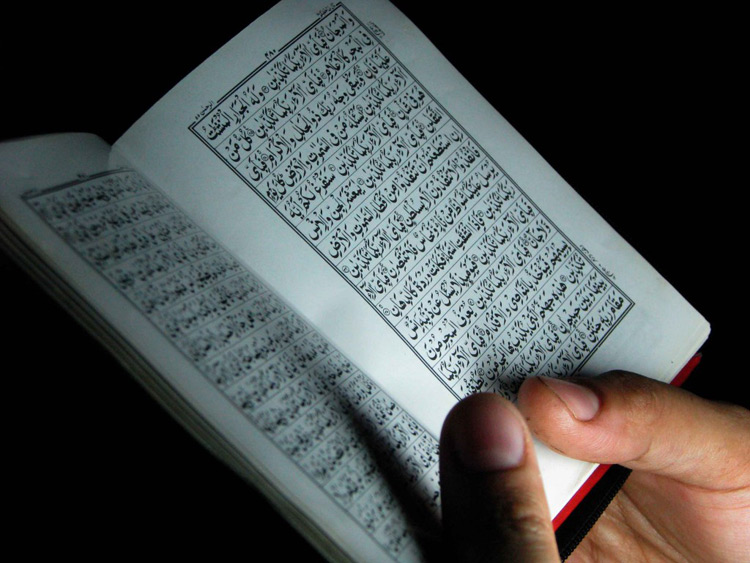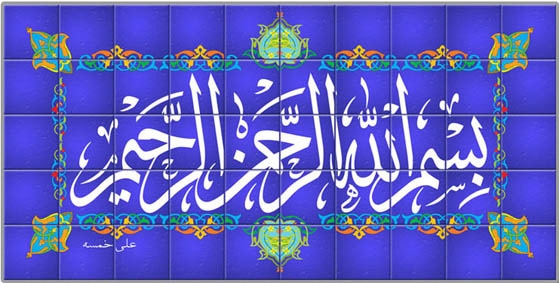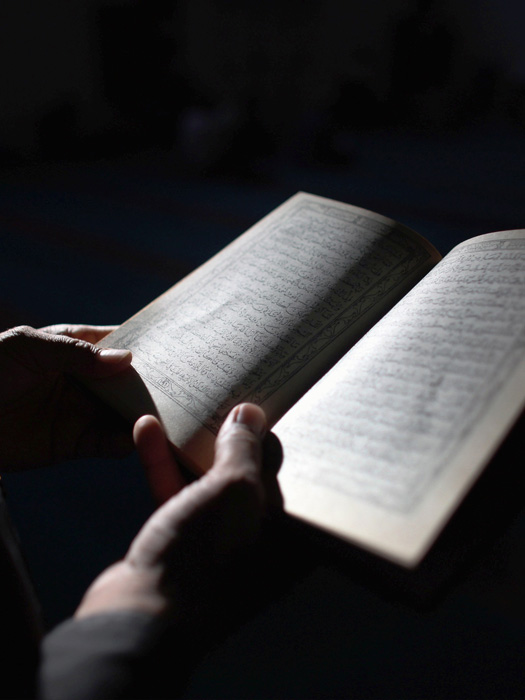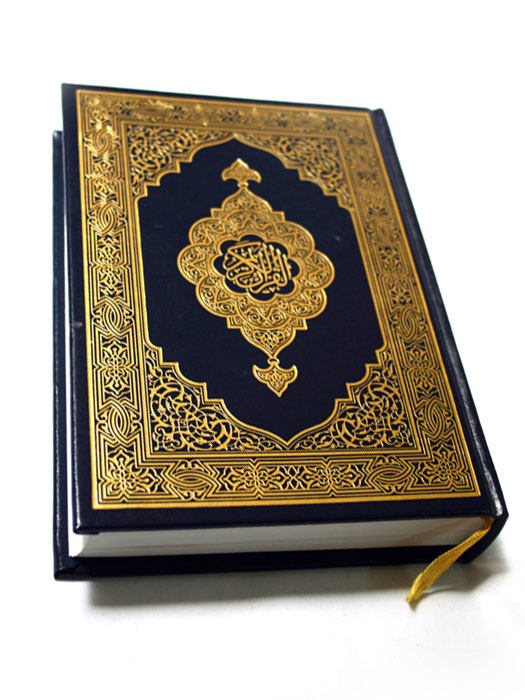 Question: It is mentioned in many traditions that no one has the right to interpret the Qur’an according to one’s personal views and opinion. And if anyone does it, his place is Hell. What is the meaning of interpreting according to one’s personal views?
Question: It is mentioned in many traditions that no one has the right to interpret the Qur’an according to one’s personal views and opinion. And if anyone does it, his place is Hell. What is the meaning of interpreting according to one’s personal views?
Answer: Muslim scholars and commentator of Qur’an are unanimous on the view that no one has the right to interpret the ayats of Qur’an according to one’s personal view and opinion. Many traditions are narrated in this regard. We present below a few examples of the same:
1. The Holy Prophet (S) said: One who interprets the Qur’an according to personal opinion1 he makes his place in fire (Hell).
2. One who interprets the Qur’an according to his view,2 even though it may be right, yet he has committed a sin.3
There are some of the traditions that are related on the topic. Now we should see what does interpretation on personal view mean.
The great commentators have given three meanings of Tafseer Bir Rayy and we shall explain each of them briefly.
1. If the commentators forms an opinion before conducting considerable research it becomes a cause that the word which has two meanings and there is no indication which meaning should be taken or an ayat is enigmatic from the aspect of its meaning and it becomes necessary to remove its doubt and ambiguity with the help of other ayats but the commentator explains it in a way which is in conformity with his preconceived notions.
In other words to justify the established beliefs and preconceived notions become the cause that one does the Tafseer of a particular ayat without any testimony and method, on the basis of his beliefs and instead of making the Holy Qur’an his guide and leader, he moulds it according to his own views. Also he were not having these views previously, he would never have interpreted in this way.4
Examples of this type of Tafseer Bir Rayy are seen in the books of those who follow the Motazela, Ashariah, Batiniyyah and Sufis. When a commentator has fully accepted the views of the Motazela or Ashariah school of thought regarding the attributes and actions of Allah and the people, when he comes to those ayats regarding whom it is possible to interpret them according to his personal belief.
And these ayats may have a different inner meaning from that of the apparent meaning and he may interpret them according to his beliefs. And instead of presenting his beliefs to the Holy Qur’an. (To evaluate on the scale of Qur’an). He presents the Holy Qur’an to his beliefs. (That is he does the tafseer of the Holy Qur’an according to his belief) and on the basis of his personal whims and desire, distorts the meaning of the ayats.
Kashaf the commentary of Zamakhshari5 is a living example of the interpretation of Qur’an according to the beliefs of the Motazela. In the same way Mafatihul Ghaib of Fakhruddin Razi is the tafseer of the Qur’anic ayats according to the Ashariah school of thought. Both these commentators had tried to justify their predestined beliefs in the light of Qur’an and they were not ready to release themselves from their past beliefs that by freeing themselves from their original faith they should have made the ayats of the Holy Qur’an material of their research which were revealed regarding the attributes of Allah and the deeds of men.
In the same way in different periods of history, the Batiniyyah and some philosophers have interpreted some ayats of the Holy Qur’an to justify their views. For example Mulla Abdur Razzaq Kashi has based his tafseer on the levels of Batiniyyah faith and Muhiyyuddin Arabi has done the tafseer of Qur’an according to his Sufi beliefs.6
This tafseer which is compiled only for the propagation of a particular school (a school whose founder was an errant and fallible person) even though some of the points may be correct but Ashariah a whole it constitutes Tafseer Bir Rayy.
At the end of the 13th century and the beginning of the 14th century this trend became common and discoveries and inventions threw up new sciences. On the basis of this a new basis of Tafseer Bir Rayy came into being for Muslim commentator and the interpretation of ayats dealing with supernatural things like soul, angels and prophets took a new shape.
So that natural and material scientists could be attracted and the ayats could be presented to them so that they may be considered valuable. The truth of our statement will become apparent if you study a tafseer like Al Manar. (Though in many of these commentaries, for example in Al Manar there are also some strong points and this is itself a remarkable thing ).
Since these intellectuals were influenced by the natural material science that is why they interpreted the ayats of Qur’an in the light of scientific research till the present time. According to some, angels were the power hidden in ones nature.
Some experts of ethics, having a keen eye for ethics and morals have gone to such limits in interpreting the ayats of Qur’an that they have explained Shaitan to be Nafs-e-Ammara and they do not accept the existence of any such thing as Shaitan.
Sometimes it is also seen that some people interpret ayats (like: Go to Firon he has exceeded his self) in the way that it is not about a particular Firon. It is about anyone who goes against his conscience.7
These kinds of commentaries are Tafseer Bir Rayy because they are influenced by pre-conceived beliefs and the apparent of the ayats is ignored and some other meaning is derived from them.
2. The second meaning of Tafseer Bir Rayy is that the initial words of the ayat are followed (without considering the confirmed proofs and studying other ayats which are related on this topic).
For example an intellectual proof and ignoring other ayats which clearly negates that God has a physical body and by the apparent meanings of some ayats which are all metaphorical and that it should be proved that Allah has a body and for example it is said: ‘The hands of Allah were on their hands’ proves that Allah has hands, although doubtlessly here hands do not denote hands of Allah but it refers to the power of Allah.
3. The third meaning of Tafseer Bir Rayy is that regarding the tafseer of the Holy Qur’an apart from the Holy Qur’an some other source is referred. Apart from the ayats concerned with Islamic laws all the Qur’anic ayats can explain all the other ayats and regarding the Tafseer of the Holy Qur’an does not require the understanding of the Companions and the Tabe’een (Companions of Companions).8
The compiler of Kashfuz Zunoon9 has mentioned five types of Tafseer Bir Rayy. Their basic points are the same as mentioned above.
Here it is necessary to mention the point that the different meanings related about Tafseer Bir Rayy are such that no one has ever said that Tafseer Bir Rayy according to the Holy Prophet (S) is Tafseer without reason so that we may object upon it and say:
“He has mentioned this meaning so that people may not understand the Holy Qur’an and they may keep Qur’an like the Christian priests of the middle ages had kept Taurat and Injeel. And to prohibit the contemplation and pondering on Qur’an thus making it into a book whose body remains among the people and its soul is unknown and its value should just remain of holy words and secret and enigmatic voice.”
Those Islamic commentators who have discussed Tafseer Bir Rayy they have not this meaning of tradition in their discussion, rather Muslim intellectuals and specially the Shia intellectuals consider reason (Aql) to be a divine argument and absolute proof so much so that they consider it in the Class of the Book, the Sunnah and Ijma (consensus).
How can they take word ‘Rayy’ that is mentioned in the tradition of the Prophet (S) in the sense of Aql and reason while in the Arabic Lexicon which is compiled to explain. The words of the Holy Qur’an and traditions mention the meaning of the word ‘Rayy’ to be Zann, Suman hadath and Tahmeem (conjecture and guess).10
If people of a particular group (Akhbaris) do not act on the apparent meaning of those ayats which are regarding the practical laws then it is not due to the fact that they say: Holy Qur’an must not be interpreted by Aql. Rather it is because the Ayats are of different types, abrogating and abrogates, general and special, absolute and conditional. And it is not possible for us to classify them without referring to the Imams of Ahlul Bayt (a.s). On the basis of this, we do not act on the apparent meanings of these ayats.
Even if one or two unreliable people have made such a statement would it be correct that such a baseless allegation should be presented in this way? That people imagine that in different periods of Islam, the Islamic intellectuals had kept the people away from understanding the Qur’an and did not permit them to understand its meanings while the same scholars and intellectuals have written hundreds of commentaries of Holy Qur’an in different languages. And to know the number of commentaries of the Holy Qur’an written by the scholars refer to Kashfuz Zunoon and Dharia.
The truth is that if they had intended to keep the Qur’an to themselves like the Taurat and Injeel they would not have written commentaries on this heavenly book. They would not have discussed and debated on the Qur’anic ayats from the aspect of Aql and traditions.
One who says this has also committed another mistake. That they have given the translation of the hadith as follows.
One who does the tafseer of Qur’an according to his personal view his abode will be filled with fires.
Although the feminine Tabbu from which Yattabbu is taken is not in the meaning of filling. Rather its meaning is to prepare and obtain the place.
Also the meaning taken by that person is for a particular place though it is definitely not so. Rather in hadith it denotes place and not a particular spot.
In the following ayat both words are used and the meaning of both is the same as we have already given.
“And when you did go forth early in the morning from your family to lodge the believers in encampments for war”11
(Either it denoted the preparation of places for them to fight).12
Thus the correct meaning of this ayat is:
One who interprets the Qur’an from his personal view he should select a place for himself in the Hell or prepare for himself a place in Fire. (And those who have construed some other meaning of the hadith it shows their ignorance of Arabic literature).
Philosophy of Islamic Laws:Ayatullah Naser Makarem Shirazi, Ayatullah Jafar Subhani
 Question: In Surah Mominoon the Almighty Allah says:
Question: In Surah Mominoon the Almighty Allah says:







